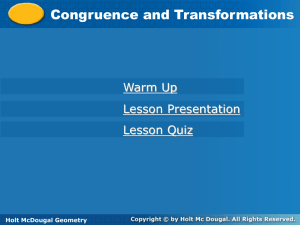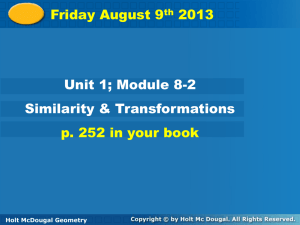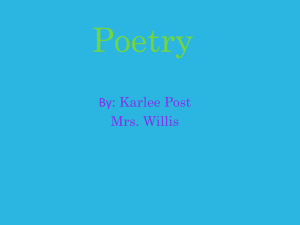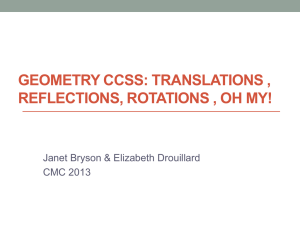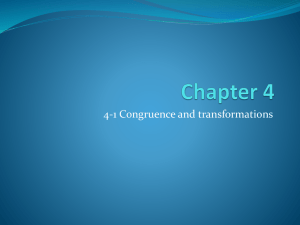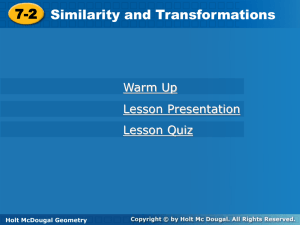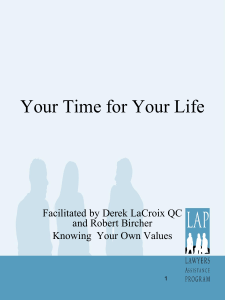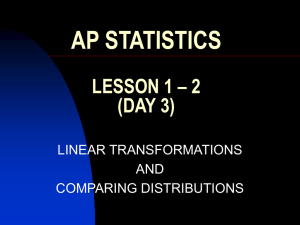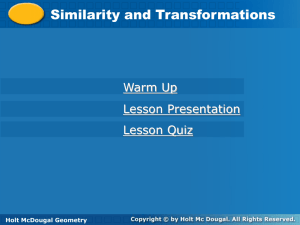4.1 Congruence and Transformations
advertisement
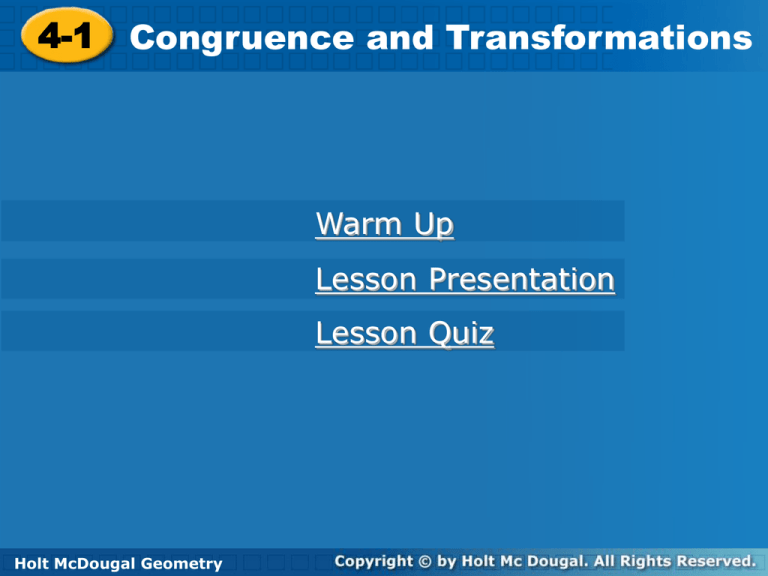
4-1 4-1 Congruence Congruenceand andTransformations Transformations Warm Up Lesson Presentation Lesson Quiz Holt HoltGeometry McDougal Geometry 4-1 Congruence and Transformations Warm Up Draw the pre-image and the image on a coordinate plane. Then identify the transformation. 1. A(-3, 1), B(-1, 1), C(-3, 4) A′(3, 1), B′(5, 1), C′(3, 4) translation 6 units right 2. A(2, 1), B(5, 1), C(4, 3) A′(2, -1), B′(5, -1), C′(4, -3) reflection across x-axis Holt McDougal Geometry 4-1 Congruence and Transformations Objectives Use properties of rigid motions (transformations) to determine whether figures are congruent and to prove figures congruent. Holt McDougal Geometry 4-1 Congruence and Transformations Vocabulary dilation isometry rigid transformation Holt McDougal Geometry 4-1 Congruence and Transformations Remember! In a transformation, the original figure is the preimage. The resulting figure is the image. A Pre-Image Holt McDougal Geometry A’ Image 4-1 Congruence and Transformations Remember! Translation: “Slide” (x, y) (x+a, y+b) Reflection: “Flip” (x, y) ( - x, y ) Across y - axis (x, y) ( x, - y ) Across x - axis Rotation: “Turn” (x, y) (y , - x) Rotation 90 Clockwise (x, y) (- y , x) Rotation 90 Counter-Clockwise (x, y) (- x, - y) Rotation 180 Holt McDougal Geometry 4-1 Congruence and Transformations A dilation with scale factor k > 0 and center (0, 0) maps (x, y) Holt McDougal Geometry (kx, ky). 4-1 Congruence and Transformations Example 1: Drawing and Identifying Transformations Apply the transformation M to the polygon with the given vertices. Identify and describe the transformation. A. M: (x, y) → (x - 4, y + 1) P(1, 3), Q(1, 1), R(4, 1) translation 4 units left and 1 unit up Holt McDougal Geometry 4-1 Congruence and Transformations Example 1: Continued B. M: (x, y) → (x, -y) A(1, 2), B(4, 2), C(3, 1) reflection across x-axis Holt McDougal Geometry 4-1 Congruence and Transformations Example 1: Continued C. M: (x, y) → (y, -x) R(-3, 0), E(-3, 3), C(-1, 3), T(-1, 0) 90°rotation clockwise with center of rotation (0, 0) Holt McDougal Geometry 4-1 Congruence and Transformations Example 1: Continued D. M: (x, y) → (3x, 3y) K(-2, -1), L(1, -1), N(1, -2)) dilation with scale factor 3 and center (0, 0) Holt McDougal Geometry 4-1 Congruence and Transformations Check It Out! Example 1 Apply the transformation M : (x, y) →(3x, 3y) Name the coordinates of the image points. Identify and describe the transformation. D(1, 3), E(1, -2), and F(3, 0) D’(3, 9), E’(3, -6), F’(9, 0); dilation with scale factor 3 Holt McDougal Geometry 4-1 Congruence and Transformations An isometry is a transformation that preserves length, angle measure, and area. Because of these properties, an isometry produces an image that is congruent to the pre-image. A rigid transformation is another name for an isometry. Holt McDougal Geometry 4-1 Congruence and Transformations Helpful Hint Translations, reflections, and rotations can be called congruence transformations. Dilations w/ k≠ 1 are not congruent transformations. Holt McDougal Geometry 4-1 Congruence and Transformations Ex 2: Determining Whether Figures are Congruent Determine whether the polygons with the given vertices are congruent. A. A(-3, 1), B(2, 3), C(1, 1) P(-4, -2), Q(1, 0), R(0, -2) The triangle are congruent; Translation: (x, y) → (x - 1, y - 3). Holt McDougal Geometry 4-1 Congruence and Transformations Example 2: Continued B. A(2, -2), B(4, -2), C(4, -4) P(3, -3), Q(6, -3), R(6, -6). The triangles are not congruent; Dilation with scale factor k ≠ 1: (x, y) → (1.5x, 1.5y). Holt McDougal Geometry 4-1 Congruence and Transformations Check It Out! Example 2 Determine whether the polygons with the given vertices are congruent. Support your answer by describing a transformation: A(2, -1), B(3, 0), C(2, 3) and P(1, 2), Q(0, 3), R(-3, 2). The triangles are congruent. Rotation: (x, y) → (-y, x). Holt McDougal Geometry 4-1 Congruence and Transformations Example 3: Applying Transformations Prove that the polygons with the given vertices are congruent. A(1, 2), B(2, 1), C(4, 2) P(-3, -2), Q(-2, -1), R(-3, 1) Translation: (x, y) → (x – 3, y + 1); Rotation: (x, y) → (–y, x). Holt McDougal Geometry 4-1 Congruence and Transformations Check It Out! Example 3 Prove that the polygons with the given vertices are congruent: A(3, 1), B(2, -1), C( 7, -1) and P(3,-2), Q(-5, -1), R(-5, -6). Translation (x, y) → (x - 1, y - 4) Rotation 90 clockwise (x, y) → (y, -x) Holt McDougal Geometry 4-1 Congruence and Transformations Lesson Quiz : Part-I Apply the transformation M to the polygon with the given vertices. Identify and describe the transformation. 1. M: (x, y) → (3x, 3y) A(0, 1), B(2, 1), C(2, -1) dilation with scale factor 3 and center (0, 0) 2. M: (x, y) → (-y, x) A(0, 3), B(1, 2), C(4, 5) 90° rotation counterclockwise with center of rotation (0, 0) Holt McDougal Geometry 4-1 Congruence and Transformations Lesson Quiz : Part-II 3. M: (x, y) → (x + 1, y - 2) A(-2, 1), B(-2, 4), C(0, 3) translation 1 unit right and 2 units down 4. Determine whether the triangles are congruent. A(1, 1), B(1, -2), C(3, 0) J(2, 2), K(2, -4), L(6, 0) not ≌; △ ABC can be mapped to △ JKL by a dilation with scale factor k ≠ 1: (x, y) → (2x, 2y). Holt McDougal Geometry 4-1 Congruence and Transformations Lesson Quiz : Part-III 5. Prove that the triangles are congruent. A(1, -2), B(4, -2), C(1, -4) D(-2, 2), E(-5, 2), F(-2, 0) △ ABC can be mapped to △ A′B′C′ by a translation: (x, y) → (x + 1, y + 4); and then △ A′B′C′ can be mapped to △DEF by a reflection: (x, y) → (-x, y). Holt McDougal Geometry
